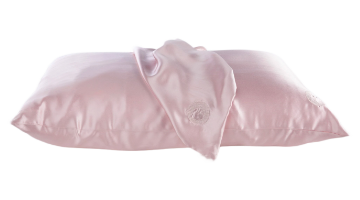Starting to feel like you’re coming down with something? Getting good rest is often the best medicine. But if your head is pounding and you’re all stuffed up (or worse), it can be tough to relax. Here, we’ll share our best tips to get the shuteye your body needs to bounce back.
Overview: Sleep Tips For When You're Feeling Sick
Getting quality sleep is essential to recovering from illness and injury. Next time you're under the weather, try these tips to comfort and soothe your tired body:
- Eliminate noise and light intrusion in your bedroom.
- Take a hot shower or bath.
- Try natural remedies like echinacea tea, aromatherapy and acupressure.
- Avoid spicy, greasy or heavy foods before bedtime.
- Sleep on your side with your head elevated to encourage digestion and drain mucus.
- Sleep on your back with your head raised to comfort head cold symptoms like runny nose, postnasal drip and more.

Why Is It So Hard To Sleep When You’re Sick?
Whether you have the common cold or all-out flu, sleeping challenges are part of the territory. But why is that, exactly?
When your body is trying to fight off an illness or repair an injury, it reacts by releasing inflammatory cytokines (proteins) into your bloodstream. These cytokines regulate the immune system, stimulate the production of blood cells, and aid in the maintenance, repair and development of tissues.
But in situations where inflammation persists, these usually helpful cytokines cause daytime fatigue, elevated heart rate, blood pressure changes and muscle and joint pain—all sleep disruptors.
Why Quality Rest is Essential When You’re Sick
There's a good reason why you typically feel tired when you're sick. It's your body telling you it's time to slow down! According to researchers, sleep is essential to your recovery in many ways:
- As we mentioned above, cytokines flood your immune system to target infections. These proteins are produced and released during sleep, so sleep can help you jump-start this process.
- Quality rest also helps your body respond to a fever better—which is another key factor in getting comfortable at night.
- When resting, your body can redirect energy to your immune system so it can get to work and start the healing process.
And since research suggests that poor sleep can make you more prone to getting sick, focusing on getting quality sleep becomes even more critical for your health.
How to Sleep Better When You Have a Cold
Feeling like your head might explode from congestion? The common cold is no fun. Congestion can make it tough to breathe through your nose, and symptoms may worsen as soon as you lay down to rest. To get through the stuffed up and achy stage, try the following tips.
1. Remove Distractions
One of the best ways to sleep when you're sick with a head cold is to cut out any stimulating factors in your environment, like ambient noises and light. Ensure that your household knows to keep noise levels low, which includes loud TVs, music, talking and alarms. As for light intrusion, a silk sleeping mask or blackout curtains can help you stay asleep.
2. Take a Hot Shower or Bath
Nothing soothes the body (and soul) like a hot shower or bath. The heat and steam can comfort aching muscles, open up your airways and relax your mind. After bathing, don your favorite comfy PJs and slip between the covers, ready for sleep.
3. Try Natural Remedies
If over-the-counter cold medications aren't your cup of tea, why not reach for an actual cup of immune-boosting tea? Echinacea, for example, has been touted for centuries as a way to cut down the length of your illness, and the hot water is sure to comfort a sore throat and stuffy nose. In fact, one clinical trial found that echinacea tea relieved the symptoms of cold and flu faster than the placebo.
Another option is gargling with salt water, which is known to help decrease upper respiratory infection that causes sleep-disrupting congestion. Experts recommend gargling with salt water several times a day, and especially right before bedtime.
4. Sleep Cool
A warm room can keep anyone awake—even if you’re not sick. Experts recommend setting your bedroom temperature between 60-67 degrees Fahrenheit to help you sleep better.
Double-down on your efforts to create the ultimate sleeping temperature with the help of cooling bed sheets, a cooling pillow and a cooling gel memory foam mattress.
5. Find the Right Sleeping Position

If you find yourself struggling to sleep with a head cold, cough or the flu, try the sleeping positions below.
Head raised sleeping position
If you're congested and stuffy, sleeping with your head elevated may help you get comfortable. With your head slightly elevated, mucus can't reach and irritate your upper airways and throat. Use a few pillows to create a small incline, or customize your comfort with the help of an adjustable base.
Side sleeping with a cold
If sleeping on your side is your go-to position, you will be happy to learn that you can still enjoy this style of sleeping while sick. Just modify it by elevating your head slightly, to keep mucus from building up in your respiratory tract.
Positions to avoid if you have a cold
Laying flat on your back without the support of a pillow or adjustable bed base is probably the worst position you can sleep in with a head cold or congestion. This is because your sinus passages can't drain properly in this position, resulting in extra sinus and head pressure.
How To Sleep Better When You're Nauseous
Whether it's due to pregnancy, acid reflux, GERD, or general digestive issues, sleeping while feeling nauseous can be incredibly challenging. Gastrointestinal symptoms like gas, diarrhea, abdominal pain, constipation, nausea, and vomiting often worsen with sleep deprivation, creating a vicious cycle. Managing these symptoms by elevating the head during sleep and avoiding trigger foods can help reduce nighttime discomfort and improve sleep quality.
1. Watch Food and Drink
Staying hydrated is essential when you’re sick, but you should also avoid foods and drinks that may aggravate health and disrupt sleep. This includes spicy foods, greasy foods and anything with caffeine.
Instead, focus on food and beverages that help with sleep—such as a soothing mug of decaf herbal tea, kiwi fruit, walnuts, cherries and whole grains.
2. Try Acupressure
Did you know that targeting and stimulating a pressure point on your wrist may help you ease nausea before bedtime? This ancient Chinese practice has helped soothe queasy stomachs for ages and may help you too! Find this pressure point by placing three fingers at the crease of your wrist with your palm facing up. It can be found between two large tendons. Once you find it, simply press down (firmly) on the groove for 2-3 minutes.
3. Consider Aromatherapy
A 2018 randomized controlled trial found that aromatherapy can be helpful in naturally managing postoperative nausea symptoms. Ginger and lavender essential oils were superior to rose oil and pure water for the aromatherapy treatments. Try adding a few drops to a diffuser before bed. Bonus—your entire bedroom will smell like a relaxing spa!
4. Find the Right Sleeping Position
Many experts believe that side sleeping, particularly on the left side, is ideal for managing digestive distress. Here’s what you need to know.
Side sleeping when you’re nauseous
If you feel like you’re going to throw up, sleep on your side with your head elevated. Sleeping on your side with your head raised can ease symptoms and keep you from choking on your vomit, if you’re unable to make it to the bathroom in time.
Nausea due to pregnancy
The American Pregnancy Association suggests that pregnant women sleep on their left side. This position allows for increased blood flow and nutrients to the placenta, helping to nourish your growing baby. Left side sleeping also reduces pressure on mom's liver while alleviating compression on the uterus.
Another position to try is Zero-G. An adjustable bed base is perfect for this, but stacked pillows can work in a pinch.
Nauseous due to digestive issues
If your stomach issues are due to digestive conditions such as GERD or acid reflux, you will want to sleep on your left side with your head slightly elevated. Researchers have found a higher rate of acid reflux when sleeping on the right side because it relaxes the muscles between your esophagus and stomach. When these muscles relax, stomach acids can irritate the esophagus more easily.
Sleep: Your Best Ally in Feeling Better Faster
Getting quality sleep when you’re sick can be difficult, but it’s truly the best remedy to healing. We hope that these sleep tips will help you find the comfort your body needs to drift off to dreamland. Feel better soon!




